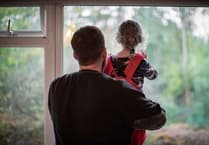A GREATHAM couple are mourning the death of their daughter who died while waiting for an ambulance.
In the early hours of Tuesday morning, Willie Wynne received a call from his 43-year-old daughter, Ingrid Wynne, who lived at Manor Fields in Liphook.
As she had a pre-existing heart problem and was “struggling to breath”, Mr Wynne rushed to her aid.
He said that he phoned an ambulance at around 12.15am when her condition seemed to be severe. He said: “I told them: ‘My daughter can’t breathe.’ “She has a heart problem. She needs help now.”
The operator told him that assistance was on the way and, if things got any worse, he should call back.
Just before 12.30am he rang again. He recalled: “I said: ‘I need help. I need it right now.’”
At this point he was told that the ambulance was travelling to them but was “48 miles away”. Eventually, his daughter “collapsed onto the ground” and fell from the passenger seat of the car.
For the final time, “at 1.06am”, he phoned for help. “She was lying on the ground,” Mr Wynne said.
“She was dead at this stage. I just held my daughter in my arms.”
After that last call, Mr Wynne said, “it felt like an eternity”, but he was joined by a first responder about “five or 10 minutes” later.
Then, he said, two ambulances arrived at the scene, but it was too late.
It had been Mr Wynne’s intention to drive Ingrid to hospital himself, but he said he decided instead to wait for an ambulance. “They have all the gear on board,” he said. “If I had driven her and she had collapsed in the car on the way, I never would have forgiven myself. Hindsight is a great thing.”
Following her death, he has spoken with a bereavement counsellor who told him that typically response times for cardiac arrest incidents are said to be between six and eight minutes. Ingrid Wynne had been diagnosed with Eisenmenger’s syndrome, and suffered from pulmonary hypertension (high pressure in the blood vessels of the lungs) among other symptoms.
Mr Wynne said that while he had not made official complaints regarding the waiting time, which he described as “shocking”, the family does intend to raise concerns with relevant organisations. Mr and Mrs Wynne’s daughter Ingrid was not married and did not have any children. “She wasn’t just my daughter,” Mr Wynne said. “She was my buddy, my friend.”
A South Central Ambulance Service spokesman said the father’s three calls were logged at 12.12am, 12.27am and 12.36am.
However, Mr Wynne said he was “100 per cent sure” that his final call, which lasted “15 seconds”, was at 1.06am. “It’s on my phone,” he added. At that time, he alleges he was still alone with his daughter.
The South Central Ambulance Service said it had also logged its first-responder arrival times slightly differently to Mr Wynne’s account of events.
“South Central Ambulance Service (SCAS) is saddened to hear that a patient we were called to on Tuesday, May 16, has died and the Trust extends its sincere condolences to the patient’s family and friends,” the spokesman said. “Having received an initial call regarding the patient at 00.12 on May 16, the symptoms being described indicated that the call required an ambulance response within 30 minutes.
“A second call was received at 00.27 describing worsening symptoms, which meant the call was upgraded to a potentially life-threatening emergency requiring an ambulance response within eight minutes.
“We always offer worsening advice to 999 callers to call us back on 999 if the patient’s condition changes, and during this assessment the category of call changed as more details were available on the patient.
“Unfortunately, at the time of the worsening call being received, the ambulance resources from the two closest ambulance stations were already committed to treating other patients and the air ambulance was unable to fly due to the weather. There were no other ambulance resources available in the local area.
“Our nearest available resources had to come from a considerable distance, with a paramedic arriving in a rapid response car at 00.39, and the nearest available ambulance being sent from the Queen Alexandra Hospital, Portsmouth. The ambulance was dispatched as soon as the crew had cleared from handing their patient over to hospital staff. Our colleagues in South East Coast Ambulance Service (SECamb) were also contacted as the patient’s property borders their area, and they were able to send an ambulance that arrived at 1.00am, with the SCAS ambulance arriving from Portsmouth at 1.05am. The patient was then taken to the Royal Surrey County Hospital in Guildford by our colleagues from SECamb.
“We would urge the patient’s family to contact our patient experience team on 0300123 9280 so that we can address directly any of their concerns.”




